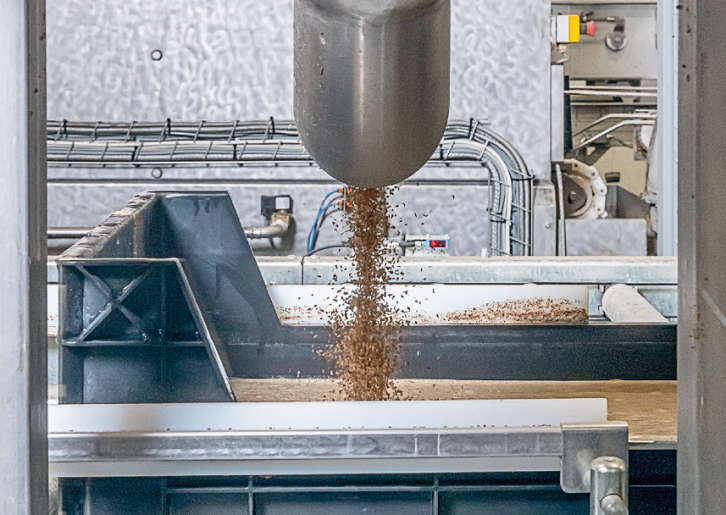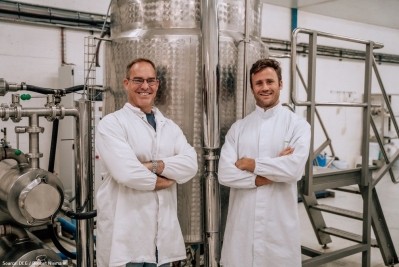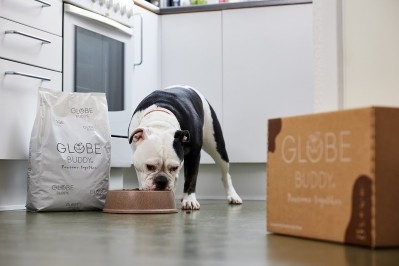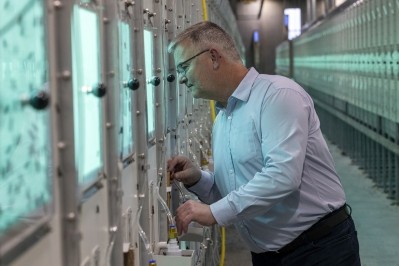The insect production industry is entering a new era and Big Dutchman spinout BIS is rowing in behind it

Over the past three years, it has been supporting Danish BSFL producer, Enorm, whose large-scale production site in Denmark is nearing completion, and is set to go live in early 2024, and it has also been collaborating with Munich based startup, FarmInsect, which last month announced it had raised €8m for its decentralized, on-site insect larvae production.
Supporting insect farmers on climate systems, air cleaning, heat recovery, feeding systems, frass handling, and housing, BIS brings together technology from its sister companies in the Big Dutchman group – SKOV, Big Dutchman and INNO+, tried and tested systems that have been used for years in pig and poultry production.
“Initially BIS was an internal project across the sister companies, initiated by SKOV. We saw there was potential to provide more than just climate systems for insect production, and we developed the concept further so that we could deliver end-to-end solutions for BSF farming. We went through a lot of internal processes, and product development, as well as system redesign,” explained Lars-Henrik Lau Heckmann, head of business development at BIS.
Some of the group’s existing air cleaning and energy recovery technology for pig and poultry production could be readily redirected towards insect farming.
“We were able to use fans for the climate system pretty much off the shelf and that was more or less the case with our heating pipes, but the installation of those needed to be adapted to suit the requirements of insect production, a process that required a lot of redesign, software development, and testing.
“However, our air cleaning technology was directly applicable to insect production – hot air is hot air whether it comes out of a broiler house or pig farm - so that was fairly plug and play, it was just about knowing which levers to turn while our feeding kitchens were inspired by the wet feeding technology for pigs, with a moderate modification making it suitable for insect farming,” continued Lau Heckmann.
A one-stop shop
BIS’s value proposition, he told us, is to bring a full system to its clients. It functions as a one stop shop, a hub taking care of the whole project, so clients only have one point of contact. “They don’t have to deal with multiple suppliers.”
“We were spun out as an independent business in June this year. We are still a developing organization, so today we are only a handful of people, but we are experts in insect farming, and we act as a gateway into the Big Dutchman group, coordinating and facilitating all inquiries related to insect production. We want to make sure the equipment is used in the right way, and that we can show our collaborators and clients that we have significant expertise on how to farm insects.
“We will expand the team further as we move into the delivery of large projects on a more frequent basis, and, as of December 1, Lars Brodersen will join us as managing director to strengthen the team and support the continued scaling up of the business.”
The Aarhus, Denmark based firm also works with a network of external partners in terms of logistics and processing. “BIS brings a farming mindset to BSF production. We have a bottom-up approach and our focus is on the farming.”
Competition fuels industry robustness
Heckmann, who has been working in the insect farming sector for the past 10 years, welcomes the growing competition in this space, believing the more technology providers the better in terms of enabling the insect farming ecosystem to flourish. “This trend creates a higher level of robustness for the industry overall. Producers need to be able to benchmark and compare one solution to another.”
Currently, a range of global insect farming business models exists, which all have, at their core, a similar approach based on the bioconversion of by-products. The feeding substrate can be purchased from one or several external suppliers. Other options are using the farm’s residual biomass or other waste.
Insect farms can be set up as a full-line production site or as a rearing facility (grower) supported by a livestock supplier (breeder).
The business model of full-line producers includes all life stages of the BSF. It normally requires a large operation and needs to secure significant volumes of feeding substrate (more than 100,000 tons of liquid feed per year). The livestock is supplied through the on-farm production of eggs. The breeder and grower models are a classic decentralization of the livestock supply chain known from other animal production business lines. Breeders supply young insect larvae (known as neonates) to growers that rear the larvae to full size ready for further processing either on site or by a third party.
“I think we will continue to see both types of insect production models going forward. If a company wants to be a large supplier of insect meal or oil for pet food or aquaculture, it needs to have a certain size of operation, facilities that are beyond 10,000 tons of larvae per year, before it reaches that tipping point where the production size is big enough that it can balance the investment needed. The upside for a big facility is that it can skim the cream, it can get a higher value for its product than selling larvae fresh or lightly processed to a third party.
“We service both the decentralized and centralized business models – the breeders and growers and full-liners as we call them. In our portfolio, we have Enorm, at the one extreme, as our biggest project, where BIS is coordinating with other partners. It will be producing 36,000 tons of BSFL per year when it goes live, and we are in talks with other potential clients of that scale, both in Europe, and Asia, but, on the other extreme, we are working with Germany’s FarmInsect – a low tonnage grower model. It is the same technology; it is just a matter of how much you scale it," said Lau Heckmann.
A new era beckons
The insect industry is going into the next phase with the space now attracting a lot of newcomers from other sectors, according to the BIS lead.
“The team behind Enorm, for example, have a pig farming background. We see waste management companies getting involved in insect production now, as well as the large food and feed integrators, like Tyson Foods in the US, along with pet food companies.”
The insect sector, according to various recent market analysis reports, has an expected annual growth of 30 to 40%, estimated to reach a global production volume of 1,000,000 tons of protein and fat per year by 2030.
Lau Heckmann envisages a return on investment (ROI) for new starters of between six and eight years.
Cost savings can also be achieved via environment focused initiatives. “Insect farming previously has not been best in class when it comes to energy consumption. Apart from having a market leading overall solution and a unique climate solution, we have integrated a heat exchanger and heat pump system from INNO+ that can recover more heat than what is required for the farming operation. While there is higher CAPEX initially from having to invest in the heat pumps, the producer would be self-sufficient in terms of heating for the climate system."
As well as heat, the emissions from insect production include moisture, greenhouse gases and odor. However, BIS also has air-to-water air scrubbers to mitigate ammonia and odor.
Pilot testing
Via pilot and proof of concept units, incorporating the Big Dutchman group’s technology, BIS can support clients on project development early on, to see whether their business case holds water.
“Our test containers allow clients to evaluate various feedstocks, to test them at relative scale, and to understand how substrates and animals work together. Clients can also generate emissions related data using these units, to see whether their process is likely to keep within the set boundaries in terms of odor at their selected production site. In addition, the containers can be used to train staff on the process. We are the clients’ sparring partners, on the side the whole time.”
BIS has a specific way of working on new insect farming projects. After a mutual agreement to align, the process is divided into five steps, from the customer’s business idea to the final stage of handing over a commercial operation:
- Pre-feasibility covers setting the overall frame of the project such as defining location, technology needs and eventually support through a business case assessment. The objective is to analyze the basic feasibility of the project and to ensure that expectations align.
- Feasibility is a stage that requires the involvement of a much larger project team, consisting of members from BIS and the customer. The customer should be able to decide whether the project should be executed or not after this step.
- Execution covers the implementation of the project and is led by a dedicated BIS project manager. The site is developed and all systems are being installed by companies affiliated with BIS and key partners.
- Technical commissioning is initiated at the end of the execution stage or when the installation of dedicated sections has been completed.
- Biological commissioning covers the last stage of project commissioning. It is the final step of integration between our technology and the animals. The objective of this phase is to implement best practices in insect farming, thus ensuring that the new production site can start commercial operation.
















